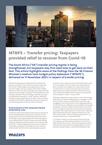
Taxpayers provided relief to recover from Covid-19
Minister Godongwana’s maiden MTBPS, revealed that gross tax revenue for the current fiscal year is expected to be R120.3 billion higher than projected in terms of the 2021 budget. The vast majority of the R120.3 billion difference came from the SA mining sector where demand and prices have surged, resulting in record profits for many mining companies. Most SA mining companies form part of multinational enterprise (“MNE”) groups. With profit shifting by large groups being a hot topic, many countries, including SA, have been tightening the reins in respect of transfer pricing policy to protect revenue streams.
Postponement of the proposed interest deductibility rules
In February 2020, the SA government issued a discussion document detailing the proposed tax treatment for SA companies that are excessively financed by way of debt. The changes were proposed given that debt funding can create opportunities for base erosion and profit shifting. Basically, MNE groups with operations in SA could extract profits from SA by charging excessive interest to their SA companies, resulting in a tax deduction in SA, which in effect shields them from SA’s relatively high corporate income tax rate. Interest income for the debt issuer could in turn be subject to tax at a lower rate, where debt has been issued by a tax resident of a country with a lower tax rate than SA. In terms of the proposal, net interest deductions by SA entities would be restricted to 30 per cent of adjusted taxable income for years of assessment commencing on or after 1 January 2021.
Although companies in some sectors, such as the mining, agriculture and online retailing sectors, managed to excel in recent times, there is no doubt that many others are struggling to survive the impact of the ongoing pandemic. It is for this reason, taking into account public commentary provided to Treasury in respect of the impact of Covid-19 on the earnings of companies, that Treasury has decided to postpone the implementation of these rules, which has been indicated in the draft response document on the 2021 draft tax bills (“the draft response document”), as issued by Treasury on 11 November 2021.
It is noted in Treasury’s draft response document that the proposal was first introduced before Covid-19 had impacted the SA economy. The draft response document reiterates the importance of strengthening the current interest limitation rules to curb profit shifting, but also notes that government is understanding of the fact that many taxpayers would have had to take on additional debt to withstand the impact of the pandemic and the lockdowns imposed. Treasury notes that the latter, along with lower earnings by companies, provides sufficient rationale to postpone the proposed rules, which will allow time for financial recovery.
Interestingly, the draft response document highlights that “the proposals will come into operation on the date on which the rate of tax in respect of the taxable income of a company is first reduced after announcement by the Minister of Finance in the Annual National Budget”. This statement serves as confirmation that it is still Treasury’s intention to reduce the SA corporate income tax rate from 28% to 27%, as indicated by Minister Godongwana’s predecessor during his last budget speech. The lowering of the rate, which will provide some relief for SA companies in terms of tax, is also intended to attract foreign investment to SA.
Foreign investments, Covid-19 and transfer pricing compliance
Foreign investment into SA, aimed at enlarging the SA tax base, should also be considered against the increased focus on transfer pricing by the South African Revenue Services (“SARS”) as well as the ongoing enhancements to the SA transfer pricing regime. Although the implementation of the proposed interest limitation rules is being postponed to provide taxpayers with relief, it is also clear that SARS has identified transfer pricing as “low-hanging fruit” for the collection of taxes. In the context of clamping down on so-called “white collar schemes”, the Commissioner of SARS has previously noted that “there are comfortably tens of billions [of Rand] that can be collected”.
Given the increased focus on transfer pricing, along with intended changes to the regime, it has become increasingly important for taxpayers to properly consider their relationships and transactions with cross-border entities. It is also critical to have those transactions which are subject to transfer pricing appropriately addressed, analysed and substantiated by way of transfer pricing documentation.
Conclusion
As can be seen from the recent MTBPS and the associated documents issued by Treasury, the SA government is not turning a blind eye to the significant effects of Covid-19 on businesses. The impact of the pandemic on MNE groups with operations in SA and the implications thereof on their cross-border payments is an increasingly important aspect when it comes to transfer pricing studies. As some sectors are benefitting from the new norm and some queuing for ventilators, transfer pricing studies have to take account of, and properly address, the short-term and long-term symptoms of Covid-19 on the business and financial performance of taxpayers.
By Malan du Toit
16/11/2021

